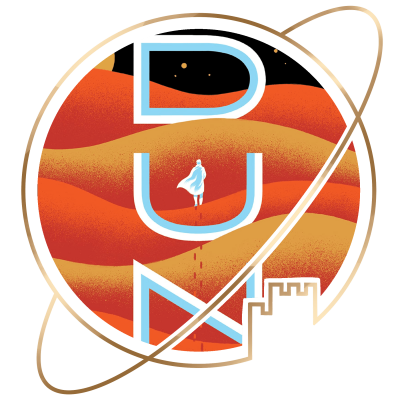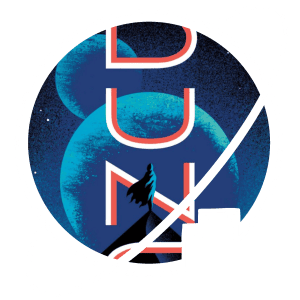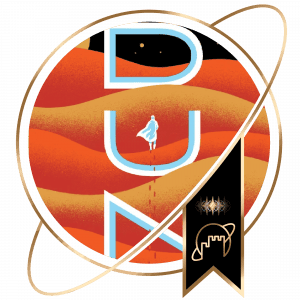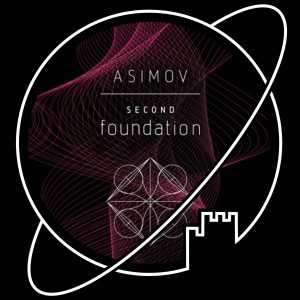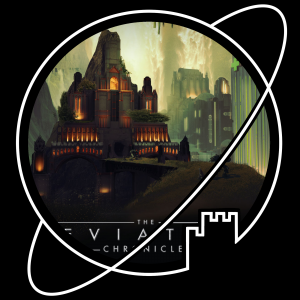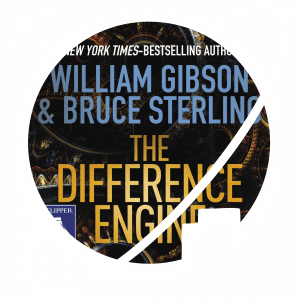- Book written by Frank Herbert
- Published August 1965
- First part in the Dune Chronicles
Paul, heir of House Atreides, and his family receive orders to move to the planet Arrakis, the rich desert world that produces the spice that allows for interstellar traffic, and take control of the fief from their arch-enemies, the Harkonnens. Though they sense a trap, his father’s honour does not allow them to defy the Padishah Emperor’s orders. In the struggle for the dominion of Arrakis that follows, Paul catches a glimpse of a terrible future that lies ahead if he does not act to change his fate.

Right out of the gate, I’m going to go ahead and say that I think Dune is one of the very best science-fiction books that was ever written. It is one of my favourite books of all time, and you can read my discussion with Jop on why I’ve added it to the collection here. I’ve said most that is to be said there, but some of it bears repeating.
In short, Dune is such a great book because of three main reasons. First, Herbert respects his reader’s ability to figure it out on their own. There is a lot of worldbuilding in Dune (more on that later), but Herbert doesn’t feel the need to explain all of it as soon as it becomes relevant – instead, things are slowly revealed as Paul, the main character, gets more and more familiar with the new planet he lives on. This creates a true sense of mystery, and learning alongside Paul, that many modern works have replaced with clever ways to have everything explained upfront.
Secondly, I really love the way the main point of view-characters, Paul and his mother Jessica, are presented: as incredibly smart, rational, and introspective. Dune is a novel with very well fleshed out characters that is not all about emotional drama, and that feels unique.
Finally, and most importantly, Dune has the best worldbuilding in the speculative genre, bar perhaps The Lord of the Rings. And unlike many other fantasy or science fiction works, the worldbuilding isn’t just there to be interesting, it is fundamental to the plot. Herbert has created a believable ecology, on top of which he layered a fascinating desert culture and a contrasting elite culture, on top of which we see the planetary politics, which are, in turn influenced by interplanetery forces, etc. Each of the layers is interesting in its own right, and the whole combines to form one of the best novels I’ve ever had the honour of reading. And I haven’t even touched on themes of religion and fate that run through the story and bind it all together.
Now, Dune isn’t for everybody. It is not a light read. It requires patience, and attention, and a lot of straining to follow along with the clever conversations of smart people full of hidden meanings that sometimes seem just out of reach. If that sounds bothersome to you, then perhaps Dune won’t be to you what it is to me. But if you feel tempted – please, give it your best shot. It is all totally worth it. Dune is just so incredibly good. So. Incredibly. Good.
Really. Go read it.

This is one of Peter’s all-time favourite books, so by all means I feel I should have liked it too. Alas, I fear I’ll break his heart with my review, for I had trouble even finishing Dune.
Dune follows a ducal family as they, entangled in political plots, try to settle on an inhospitable planet and later rise in rebellion against their enemies. Paul Artreides, the only son and heir of house Artreides is the main protagonist. Other POV-characters include his mother Jessica, several (loyal) followers, and the antagonists.
Although the premise of the plot is promising, I would not say it is in any way one of the strong points of this story. Indeed, most of the plot points are consistently spoiled by the codices at the start of each chapter. Such a foreshadowing technique might have been interesting if the characters could carry the story on their own, but in my experience Frank Herbert never really succeeds in making his characters well-rounded or relatable. Some of the characters are superhumans who experience emotions in different ways than normal humans are used to, an interesting concept, but even in these cases the characterization seemed to lack.
It is possible I could have overcome the above listed shortcomings, had it not been for Frank Herberts writing style. I found there was too much “tell” instead of “show”, which occasionally even resulted in overwhelming info dumps. Although I recognize his prose is not at all bad, his style was not a fit for me.
All in all, Dune’s strongest elements were its worldbuilding (well thought out and comprehensive) and the underlying themes. Can one change their fate? What does it mean to be human? What is the essence of religion? These are just a few of the many questions raised in the story, in addition to multiple environmental issues. I appreciate how Frank Herbert handles these major themes, even though the rest of the book didn’t really appeal to me.
In conclusion, I understand how Dune came to be an influential classic in its genre. However, I would not quickly recommend it to readers who enjoy a gripping plot and/or relatable characters.

Nope, this book is most definitely not for me. Apparently this is considered a classic. However, the outrageous amount of unnecessary new words that are used in every sentence makes it a very hard task to get through. I listened to the first quarter of the story as an audio-book. Pro: you can ignore all the words you don’t know. Con: every time the evil guy starts to plot his evil political scheme, my brain automatically drifts away.
After that I read some more chapters in a real book. I was curious to see the new world they were travelling to. I never got to see it, after reading 300+ pages I was completely done. They never left the spaceship.
Like I said. This book is not for me. If you are looking for a book that is accessible, look further.






